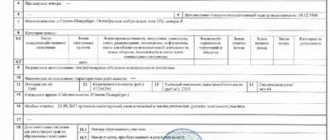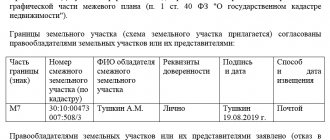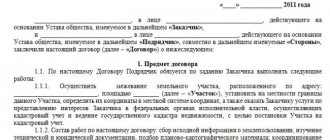Category updated: July 19, 2021
Mitrofanova SvetlanaLawyer. Work experience - 15 years
Hello. In this section, I will talk about such a transaction as the donation of a land plot, how it is formalized, what the conditions, features and taxes are. Here I am talking about a transaction with a “bare” plot without buildings or with buildings, but which are not registered as property. If you need to find out about donating a plot along with a house, I have a separate article on this topic.
The donor is the one who donates the land. The donee is the one who accepts the gift (Clause 1, Article 572 of the Civil Code of the Russian Federation).
What is donation of land
A deed of gift for a land plot is a document, an agreement between 2 people, according to which one person (he is the owner of the land and can dispose of it) donates it free of charge to another person (the donee, who has the right to accept or not accept the subject of the transaction into his possession) piece of land. The main feature that distinguishes donation from other transactions for the alienation of property rights is gratuitousness.
The subject of donation, that is, a land plot, can be transferred only of good will and only free of charge. If doubts arise on these points, the transaction can be challenged in court.
Important! You can donate land to anyone - a close relative or a stranger. The question is the taxation of the gift and the procedure for registering it upon transfer.
A deed of gift for a plot of land is drawn up in accordance with the provisions of the Civil Code of the Russian Federation. Donating a plot of land to a relative or other person has its advantages and disadvantages.
Advantages of registering a gift agreement
We can highlight:
- possibility of appealing the transaction. Donation of land is an expression of goodwill towards a third party; the subject of the expression is the allotment. It is possible to challenge a transaction for the gratuitous donation of a plot of land, but it is difficult compared to other civil transactions for the alienation of rights;
- taxation. More often, a deed of gift for a land plot is drawn up between close relatives. This makes it possible to obtain property rights now, without waiting for a will. In addition, such transactions are not subject to tax;
- simplicity in design. If the parties are close relatives, then a simple written form is sufficient. Notarization of a gift agreement is required only when the parties do not have family ties or are not close;
- the recipient becomes the owner of the land after signing the agreement, and not after the transaction is registered in Rosreestr. Registration of the agreement with Rosreestr is a prerequisite, since the subject of the transaction is a real estate object;
- Land donated cannot be common property. Therefore, the risk of disputes with another owner is minimized.
Important! Donating a plot of land can be an alternative to alienating a share in shared ownership. For example, if another owner does not want to sell his share of the site, others can donate theirs to third parties.
Disadvantages of drawing up a gift agreement
Like any other transaction for the alienation of civil rights, donation has its drawbacks. These include:
- the deal is unconditional. That is, the donor does not have the right to establish any additional conditions for the transaction;
- if the parties are not close relatives, then it is necessary to pay a tax of 13% of the transaction value. It is determined through cadastral valuation. If the donee is not a resident of Russia, then he will have to pay 30% of the cadastral value.
Important! To pay the tax, you must independently submit a declaration in Form 3-NDFL. Payment occurs upon submission of documents. Tax officials are conducting a desk audit.
The legislative framework
Despite the fact that the land plot, and therefore all legal relations that arise as a result of transactions with it, fall under the jurisdiction of the land code, we still have to turn to the civil code.
The fact is that civil legislation best establishes the main stages of transactions that can be carried out between citizens.
A gift transaction is no exception.
Let us stipulate in advance the fact that we are talking about real estate, which can participate in civil circulation and is not limited in it. The deal and its features are enshrined in Article 572 of the Civil Code. It is in this norm that you will find the concept of a transaction, as well as the main stages and principles of its implementation.
Before using this procedure in practice, be sure to familiarize yourself with the theory. In addition, in the process of formalizing the donation of a land plot, a relative may need information from the Tax Code, as well as other civil legislation that accompanies such a procedure.
Now that you know all the stages of the transaction, and most importantly, where to go in order to get clarification, we will inform you that there is another, no less important source of information.
Reference! Sources of law include court decisions that were made in similar cases.
For example, there was a dispute between the parties about the appropriation of a land plot, or an appeal against a transaction such as a donation. Based on the court's decision, you can draw a conclusion about which actions may be legal and which can be appealed by other owners.
Therefore, in order not to get burned and not to be accused of non-compliance with any rights, be sure to read such documents.
List of required documents
How to draw up a deed of land? To do this, you need to draw up an agreement in simple written form, read it carefully, sign it and submit it for registration. But the following documents are needed:
- passports of both parties;
- an extract from the Unified State Register of Real Estate confirming the property right of the donor and the absence of encumbrances;
- the document on the basis of which the owner has his right;
- technical passport for buildings, if they exist on the ground. These documents are necessary to verify the legality of these buildings;
- cadastral documentation for land. Its presence means that the site has a cadastral number. But before concluding a deal, it is recommended to carry out land surveying and approve the boundaries of the land;
- if the plot was acquired during marriage, then the notarized consent of the spouse.
Based on technical and cadastral documentation, as well as an extract from the Unified State Register of Real Estate, a donation agreement for a land plot is drawn up. You need to prepare 3 identical documents. One copy for the parties to the transaction, and one copy in Rosreestr in the “personal file” of the allotment.
Sample deed of gift
A land donation agreement may look like this:
Main stages of contract execution
In order to formalize a donation agreement, the subject of which is a plot of land, it is necessary to go through several stages:
- Collect the necessary documentation.
- Prepare a draft agreement. If necessary, you can involve a lawyer.
- Introduce the recipient to the project.
- Sign the agreement and attach copies of the necessary documents. If the parties are not relatives, then it must be certified by a notary. He will once again check the correctness of the drafting.
- Submission of the contract for registration to Rosreestr. You can register a deed of gift for a land plot at the MFC, since Rosreestr has not worked directly with citizens for several years.
- Waiting for ready documents. Re-registration of the right occurs within 10 working days.
- Receive an extract from the Unified State Register of Real Estate.
Important! To notarize a deed of gift, you must pay a fee. Its size depends on the cadastral value of the donated item. You will also need to confirm that the donor has no property tax debts. To do this, you will need to take a certificate from the Federal Tax Service at the location of the gift.
Advice from a lawyer on drawing up a deed of gift:
Do I need to certify?
The deed of gift can be drawn up independently or with the help of a notary. In the first case, notarization is not necessary.
But his participation will guarantee the fulfillment of obligations. According to Federal Law No. 218 (Article 54) of July 13, 2015, the deed of gift must be certified by a notary if the donor is a minor or incapacitated citizen.
Certification of the deed of gift will also be required when donating a share of property (if one of the owners is involved).
Taxation of gift deeds
Receiving a plot of land as a gift is the basis for the emergence of taxable income. According to tax law, you need to pay income tax. The donee must do this, since it is he who receives the additional profit.
Personal income tax must be calculated independently. To do this, you need to know whether the recipient of the gift is a resident of the Russian Federation or not. If yes, then 13% of the cadastral value is due for payment (if it is not established, then of the estimated value. But this happens rarely). If the recipient of the gift is not a resident, then 30% of the cadastral value is subject to payment.
The exception is close relatives. If they act as parties to the agreement, then the donee is exempt from paying the mandatory income tax. But when registering a transaction, you will need to confirm the presence of close family ties. Close relatives are:
- parents - children;
- grandparents – grandchildren/granddaughters;
- siblings and half-brothers.
A transaction between a nephew and an aunt no longer falls under close relationship. Therefore, you will have to pay tax.
How to donate land to a close relative
A standard agreement is drawn up. If relatives have the same surnames, this benefits them. It is not necessary to confirm your relationship! But there are cases of fraud when a transaction occurs between namesakes and not relatives. Therefore, it is recommended to indicate the fact of relationship in the “body” of the agreement, and attach supporting documents to it.
For example, a father gives his daughter an apartment. Their surnames are different, since the daughter got married and is already in her second official marriage. To confirm your relationship, you must attach copies of the following documents:
- her birth certificate, which shows her previous name;
- marriage registration certificate confirming the transition to the surname of the first husband. An archival certificate from the registry office is also suitable;
- certificate of termination of these ties;
- a new certificate of remarriage, and a transition to the current surname.
Important! Confirmation of relationship is necessary in order to exclude the obligation to pay tax. Otherwise, tax authorities may become interested in the transaction and require confirmation of preferential treatment or payment of personal income tax.
You can get more detailed information regarding the issue of donation between close relatives in our other article.
Is it possible to revoke a deed of gift?
There are legal grounds for revoking a gift agreement. These include:
- initiative of the guardianship authorities and their reasoned decision if the transaction violates the rights of minor children;
- a committed and proven crime that the donee committed against the life and health of his donor;
- recognition of the donor (he may be an individual or individual entrepreneur) as financially insolvent. To cancel, it is necessary that less than a year has passed since the signing of the agreement;
- initiative of the donee himself, if he refuses to take possession of a plot of land under a gratuitous transaction.
Cancellation of the donation is carried out in court. Except for the last case! It is enough for the recipient of the gift not to sign the contract for the operation to not take place. If he is pressured, threatened or otherwise forced to sign a document, he can challenge the transaction afterwards. But he will have to prove the fact of coercion.
After the court cancels the deal, the gift is returned to its former owner. Based on a judicial act, ownership rights are re-registered.
Exceptional cases
In certain cases, the donor can demand back the donated land and there is a high probability that he will receive it. The donor can file a lawsuit to cancel the contract if the recipient poses a serious threat both to the person who gave him the land free of charge and to his family. For example, caused bodily harm, threatened or attempted murder, and committed other harm to the donor. The agreement may also be declared invalid if the person who accepted the land as a gift does not treat it properly, for example, in a manner inconsistent with its intended purpose or status.










